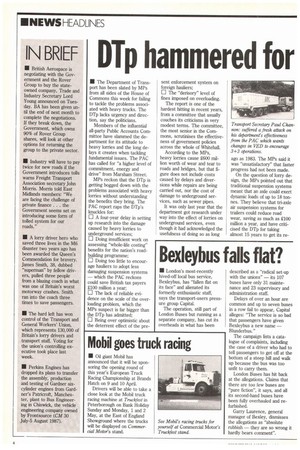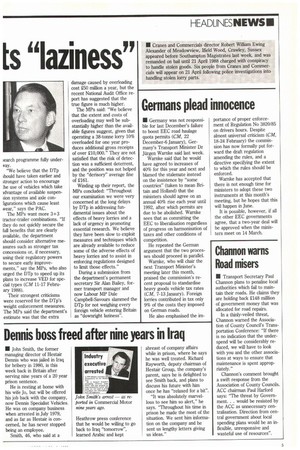Dip hammered for Is "laziness"
Page 6

Page 7

If you've noticed an error in this article please click here to report it so we can fix it.
• The Department of Transport has been slated by MPs from all sides of the House of Commons this week for failing to tackle the problems associated with heavy trucks. The DTp lacks urgency and direction, say the politicians.
Members of the influential all-party Public Accounts Committee have slammed the department for its attitude to heavy lorries and the long delays it creates when tackling fundamental issues. The PAC has called for "a higher level of commitment, energy and drive" from Marsham Street.
MPs reckon that the DTp is getting bogged down with the problems associated with heavy lorries without understanding the benefits they bring. The PAC report raps the DTp's knuckles for:
LI A four-year delay in setting up research into the damage caused by heavy lorries to underground services;
O Doing insufficient work on assessing "whole-life costing" benefits for the nation's roadbuilding programme; O Doing too little to encourage hauliers to adopt less damaging suspension systems — which the PAC reckons could save British tax payers £100 million a year;
ED The lack of reliable evidence on the scale of the overloading problem, which the MPs suspect is far bigger than the DTp has admitted;
O Being over optimistic about the deterrent effect of the pre sent enforcement system on foreign hauliers; O The "derisory" level of fines imposed on overloading.
The report is one of the hardest hitting in recent years, from a committee that usually couches its criticisms in very modest terms. The committee, the most senior in the Commons, scrutinises the effectiveness of government policies across the whole of Whitehall.
According to the MPs, heavy lorries cause £600 million worth of wear and tear to roads and bridges, but that figure does not include costs caused by delays and diversions while repairs are being carried out, nor the cost of damage to underground services, such as sewer pipes.
It was only last year that the department got research under way into the effect of lorries on underground services, even though it had acknowledged the usefulness of doing so as long ago as 1983. The MPs said it was "unsatisfactory" that faster progress had not been made.
On the question of lorry design, the MPs pointed out that traditional suspension systems meant that an axle could exert dynamic loads of up to 18 tonnes. They believe that tri-axle air suspension systems for trailers could reduce road wear, saving as much as .E100 million a year, and have criticised the DTp for taking almost 15 years to get its re learch programme fully underway.
"We believe that the DTp should have taken earlier and stronger action to encourage he use of vehicles which take xlvantage of available suspension systems and axle con5gurations which cause least wear," says the PAC.
The MPs want more 3+3 tractor-trailer combinations. "If they do not quickly secure the full benefits that are clearly available, the department should consider alternative measures such as stronger tax concessions or, if necessary, using their regulatory powers to secure early improvements," say the MPs, who also urged the DTp to speed up its plans to increase VED for special types (CM 11-17 February 1988).
Their strongest criticisms were reserved for the DTp's weight enforcement measures. The MPs said the department's estimate was that the extra damage caused by overloading cost £50 million a year, but the recent National Audit Office report has suggested that the true figure is much higher.
The MPs said: "We believe that the extent and costs of overloading may well be substantially higher than the available figures suggest, given that operating a 38-tonne lorry 10% overloaded for one year produces additional gross receipts of over £10,000." They are not satisfied that the risk of detection was a sufficient deterrent, and the position was not helped by the "derisory" average fine of £161.
Winding up their report, the MPs concluded: "Throughout our examination we were very concerned at the long delays by DTp in addressing fundamental issues about the effects of heavy lorries and a lack of urgency in promoting essential research. We believe they have been slow to exploit measures and techniques which are already available to reduce some of the adverse effects of heavy lorries and to assist in enforcing regulations designed to limit those effects."
During a submission from the department's permanent secretary Sir Alan Bailey, former transport manager and now Labour MP Dale Campbell-Savours slammed the DTp for not weighing every foreign vehicle entering Britain as "downright laziness".




























































































